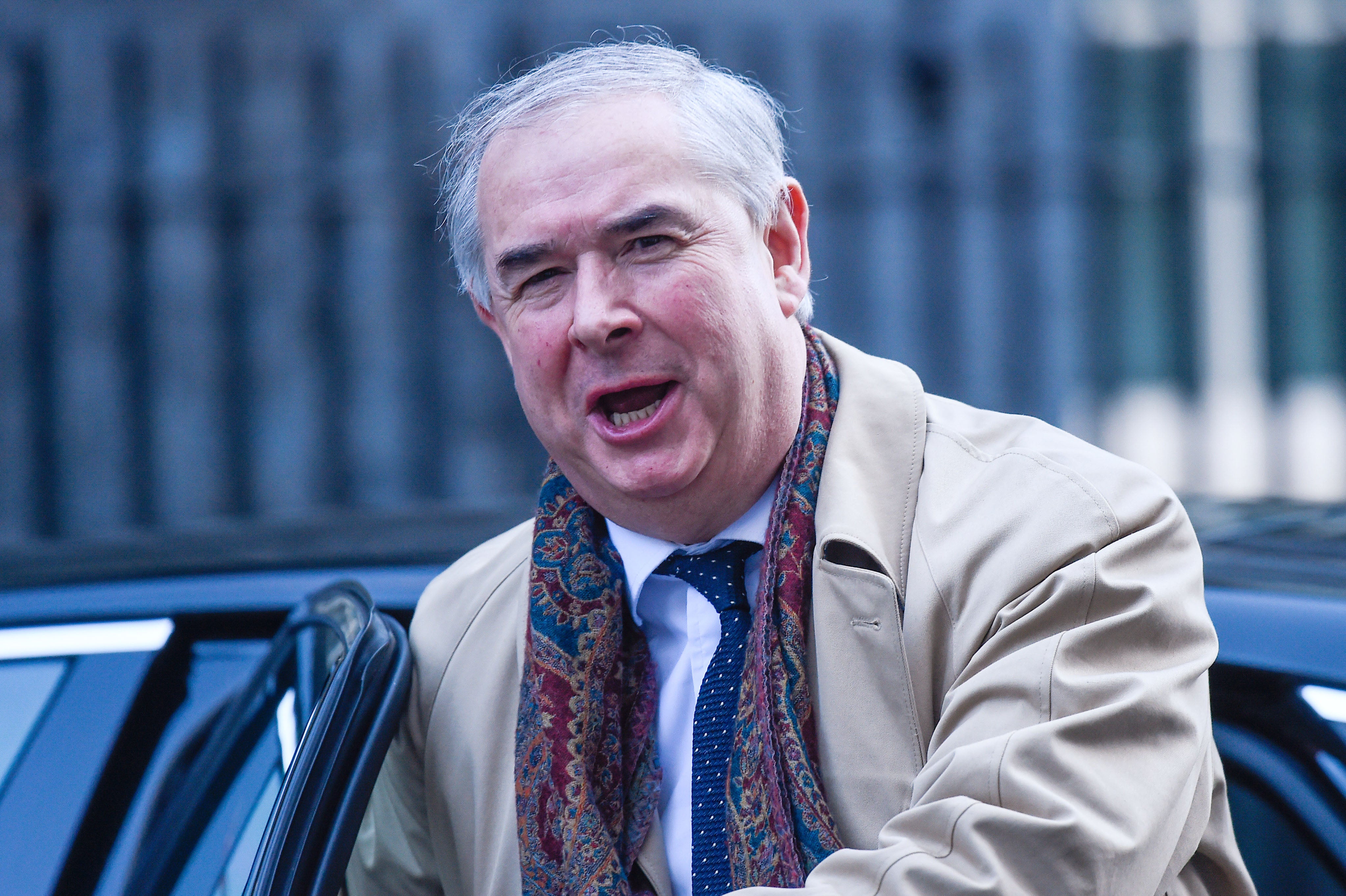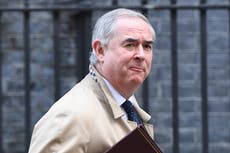Geoffrey Cox timeline: How the Tory MP became embroiled in second jobs scandal
Ex-attorney general among wealthiest MPs in Commons and has made millions from carrying out legal work alongside his parliamentary duties

The sleaze scandal surrounding Boris Johnson’s government is continuing to dog the prime minister a week on from the row that erupted over his decision to order MPs to save ex-Northern Ireland secretary Owen Paterson from a six-week suspension after the Commons Standards Committee found him guilty of breaking a centuries-old ban on parliamentary lobbying.
Now the spotlight is trained on Sir Geoffrey Cox, Conservative MP for Torridge and West Devon since 5 May 2005 and the former UK attorney general.
Sir Geoffrey, a practising barrister since 1982 and Queen’s Counsel since 2003, is understood to be among the highest-earning members of the House of the Commons and is facing scrutiny over the amount of money he has earned from additional work carried out alongside his duties as an MP, which already earns him a £81,900-a-year salary.
He was forced to give up private practice during his tenure as attorney general between 9 July 2018 and 13 February 2020, when he advised first Theresa May and then Mr Johnson through a torrid period of Brexit negotiations with the EU, but either side of that role he is believed to have performed hundreds of hours of legal work for his clients, a number of whom are involved with tax havens like the Cayman Islands and British Virgin Islands, whom Sir Geoffrey has argued it is “beneath the dignity” of the British government to crack down upon.
Labour deputy leader Angela Rayner has called on the parliamentary commissioner for standards, Kathryn Stone, to investigate his extracurricular activities and called for the MP’s resignation, saying: “You can be an MP serving your constituents or a barrister working for a tax haven - you can’t be both and Boris Johnson needs to make his mind up as to which one Geoffrey Cox will be.”
The QC has issued a statement via his website insisting that he does not believe he has broken Commons rules but will “fully cooperate” with any inquiry, insisting that he “regularly works 70-hour weeks” but gives “primary importance” to his constituency work.
The prime minister has meanwhile been forced to insist the UK is “not remotely a corrupt country” after being questioned on the Paterson and Cox affairs by reporters at the Cop26 climate summit in Glasgow, a major embarrassment with his fellow world leaders looking on.
Here’s a timeline of how the furore surrounding the veteran MP erupted.
9 July 2018
Sir Geoffrey Cox appointed attorney general by Theresa May. Gives up private practice as condition of accepting the role.
That same year, he took part in a parliamentary debate on the Sanctions and Anti-Money Laundering Bill in which he defended overseas tax loopholes, arguing against British government intervention, having himself earned considerable fees from representing law firms based in the Caymans between 2016 and 2018 by his own admission.
13 February 2020
Sacked as attorney general by Mr Johnson in reshuffle after controversial role in forcing through Brexit, which saw him accuse the Supreme Court of the United Kingdom of being “motivated by political considerations” when it overturned a High Court verdict the previous September to rule that Mr Johnson’s prorogation of parliament had been unlawful.
Subsequently returns to legal career and begins working as consultant global counsel to Withers LLP on behalf of the British Virgin Islands, who pay him £468,000 a year for 48 hours of work per month while he earns a further £130,000 from other legal clients, according to the Commons register of interests.
26 April 2021
Arrives in the Caribbean for a month’s stay in Mauritius on the same day the House of Commons holds a debate on global corruption.
Sir Geoffrey subsequently says he was given permission by chief whip Mark Spencer to utilise proxy voting rules brought in during the Covid-19 lockdown to allow him to participate in the Commons ballot while working from the West Indies.
14 September 2021
Sir Geoffrey allegedly takes part in an online hearing representing the British Virgin Islands Commission of Inquiry from his Westminster office, a possible breach of the parliamentary code of conduct.
1 November 2021
Renews contract with Withers, netting him £400,000 a year for 41 hours’ work a month, taking his total earnings from the firm since leaving his post as attorney general to almost £900,000, again according to the register of interests.
10 November 2021
Labour’s deputy leader writes to the parliamentary commissioner for standards urging an investigation after calling for Mr Cox’s resignation.
Sir Geoffrey issues his statement denying that he has broken Commons rules while pledging to cooperate with any inquiry.
11 November 2021
Conservative business minister Paul Scully follows health secretary Sajid Javid in declining to explicitly support Sir Geoffrey when invited to do so by Sky News, saying instead: “That’s up to Geoffrey, it is between him and his voters.”
The Daily Mirror reports that Sir Geoffrey has been renting out his London residence, which taxpayers helped fund, while also claiming £1,900 a month for a second home in the capital.
A spokesperson for his office comments: “The flat was purchased in early 2004, prior to Sir Geoffrey’s election to Parliament. While he claimed mortgage interest payments until 2010, fully in accordance with the rules, thereafter they ceased to be paid by Parliament. The flat was let out from late 2017 as declared in the register.”
The Guardian meanwhile calculates that he has earned more than £6m in total since 2015 in addition to his Commons salary from second jobs.
Join our commenting forum
Join thought-provoking conversations, follow other Independent readers and see their replies
Comments

Bookmark popover
Removed from bookmarks